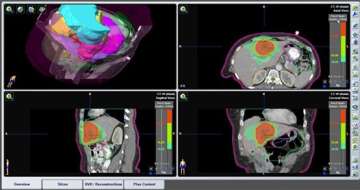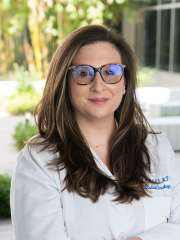GI Cancers (Rectal, Anal, Pancreas)
Find your care
Radiation oncologists use a patient-centered approach and individualized treatment plans. To learn more and make an appointment with a UCLA radiation oncologist, contact us at:
Westwood - 310-825-9775
Santa Clarita - 661-287-0010
Santa Monica - 424-259-8777
Gastrointestinal Cancer Radiation Therapy and Treatment at UCLA
Radiation therapy is effective and commonly utilized alone or with surgery and chemotherapy for rectal cancer, anal cancer, gastric cancer, pancreatic cancer, and hepatobiliary maligancy. In addition, a highly sophisticated, pin-point radiation called stereotactic body radiation therapy (SBRT) is available at UCLA to treat limited metastatic disease from gastrointestinal malignancies.
- Depending on the location and stage of your cancer – chemotherapy and/or radiation therapy may be given before or after surgery.
- For rectal cancer, radiation therapy is usually given with chemotherapy. It can be given before or after surgery
External Beam Radiation Therapy
External beam radiation therapy involves a series of daily outpatient treatments to accurately deliver radiation to the area at risk. The radiation beam comes from a machine called a linear accelerator or linac.
- Before beginning treatment, you will be scheduled for an appointment (called a simulation) to map out the area being treated. This will involve having a CT scan. You will also receive tiny marks on your skin, like a tattoo, to help the therapists precisely position you for daily treatment.
- To minimize side effects, the treatments are given five days a week, Monday through Friday. This allows doctors to get enough radiation into your body to kill the tumor while giving healthy cells time to recover each day.
- At UCLA, we have state-of-the art and comprehensive treatments including intensity modulated radiation therapy (IMRT), rapid-arc, 3-dimensional conformal radiation therapy, as well as SBRT to offer to patients with GI malignancies. We collaborate extensively with our colorectal/surgical oncologist colleagues and GI medical oncologist at UCLA to attack the disease in a multi-disciplinary fashion.
What You Should Know About Possible Side Effects
People with colorectal cancer often get chemotherapy while they receive radiation therapy. Side effects during treatment are due to the radiation to the pelvic area and the effects of chemotherapy throughout the body.

- Possible side effects from radiation include more frequent bowel movements, diarrhea, abdominal cramping, pressure or discomfort in the rectal area, urinating more often, burning with urination, skin irritation, nausea and fatigue.
- These are usually temporary and resolve after your treatment ends.
- Chemotherapy side effects will depend on the specific drug you receive.
- Treatment may affect your ability to have children. Talk to your doctor to see whether your specific treatments may harm your fertility.
- Side effects are not the same for all patients. Ask your doctor what you can expect from your specific treatment.
Many of these side effects can be controlled with medications and changes to your diet. Tell your doctor or nurse if you experience any discomfort so they can help you feel better.
Our Expert Radiation Oncologists
The following UCLA Radiation Oncologists specialize in treatment of gastrointestinal cancer:
